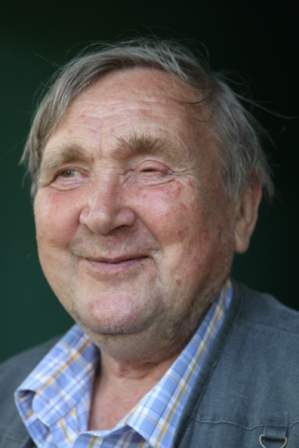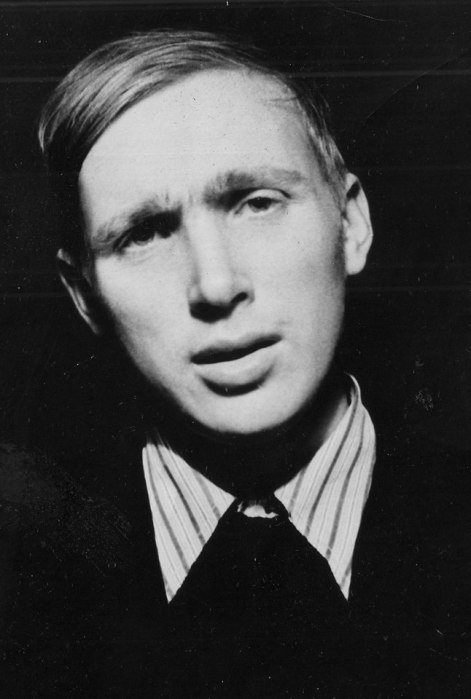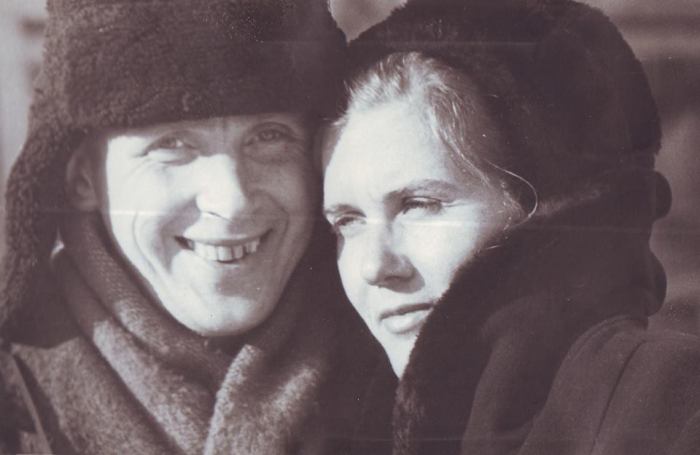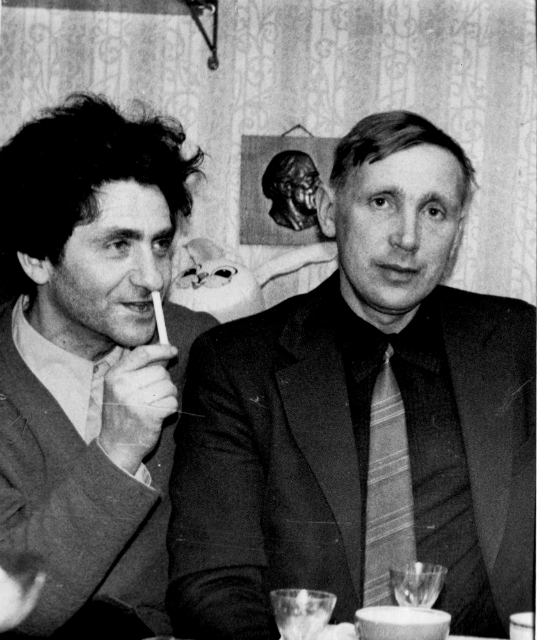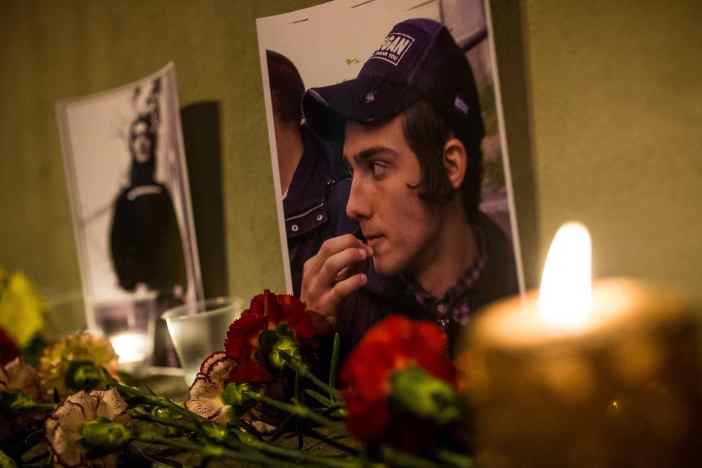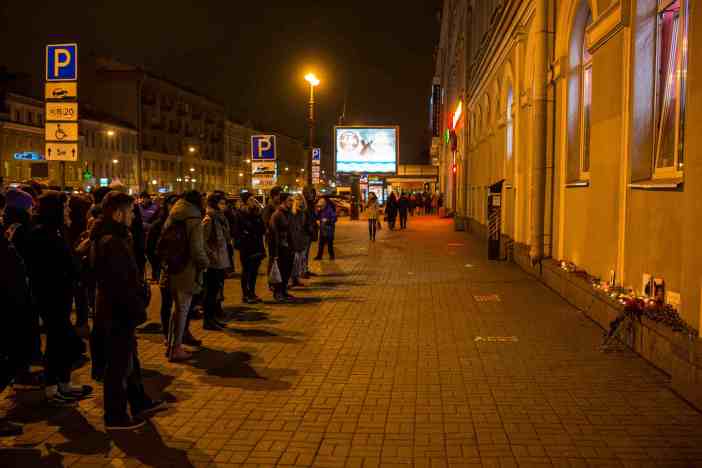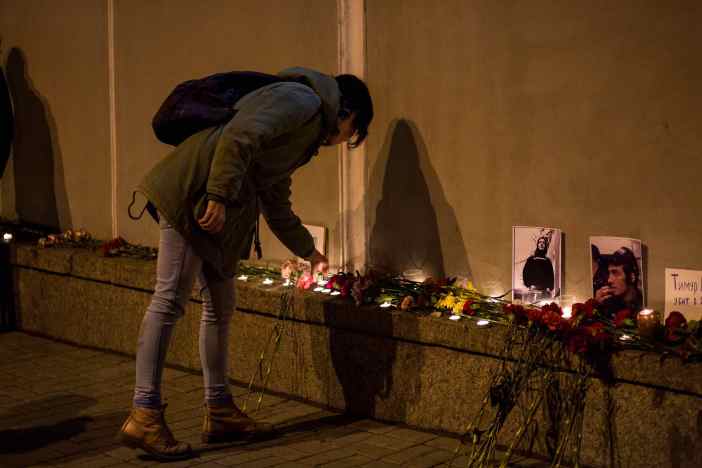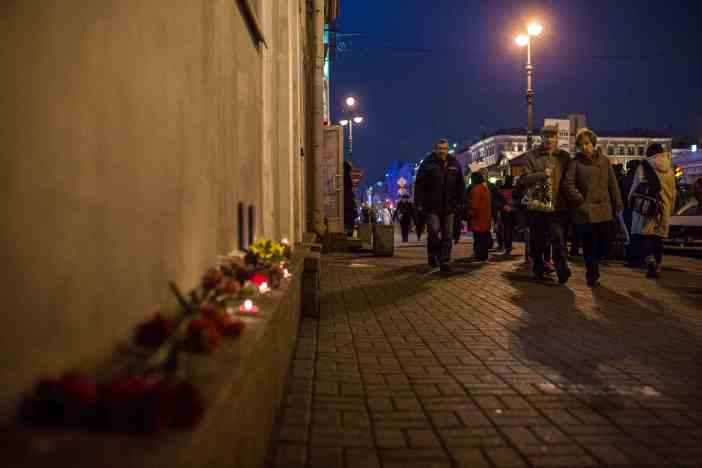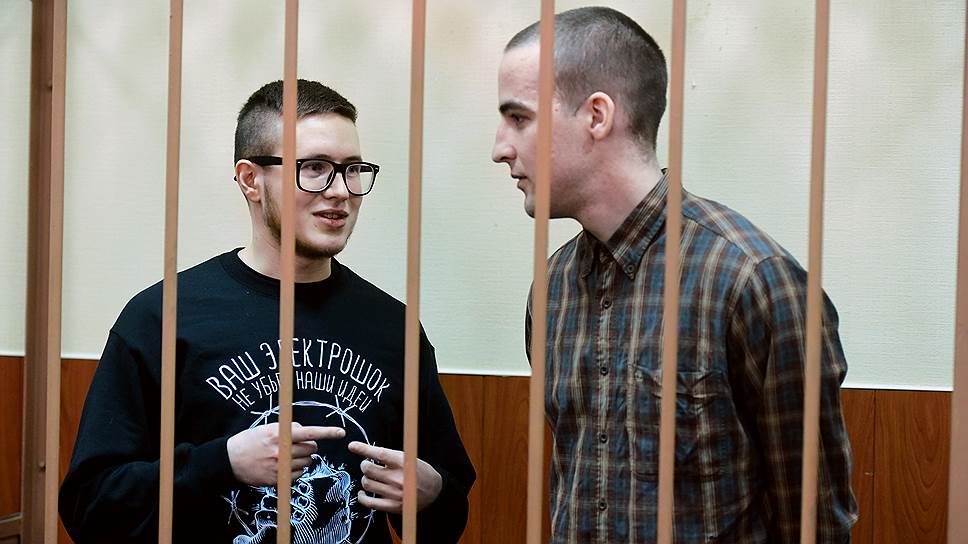 Network case defendants Viktor Filinkov and Yuli Boyarshinov in the cage at court yesterday. Filinkov (left) wears a sweatshirt emblazoned with the slogan, “Your taser can’t kill our ideas.” Photo by Alexander Koryakov. Courtesy of Kommersant
Network case defendants Viktor Filinkov and Yuli Boyarshinov in the cage at court yesterday. Filinkov (left) wears a sweatshirt emblazoned with the slogan, “Your taser can’t kill our ideas.” Photo by Alexander Koryakov. Courtesy of Kommersant
The Defendants Were Assigned Roles: Network Trial Gets Underway in Petersburg
Anna Pushkarskaya
Kommersant
April 9, 2019
The court trial in the case of the “anarchist terrorist community” Network got underway in St. Petersburg. Viktor Filinkov, a 24-year-old programmer, and Yuli Boyarshinov, a 27-year-old industrial climber, have been charged with involvement in Network. Federation Council member Lyudmila Narusova, who attended the hearing, pointed out the “ability to throw grenades,” which the prosecution included in the evidence against the defendants, was taught officially to members of the patriotic youth movement Yunarmiya.
“This case has nothing to do with the rule of law,” Narusova noted.
Filinkov and Boyarshinov’s case is being tried in St. Petersburg by the Moscow District Military Court. In January, the same court sentenced Igor Shishkin, who made a deal with case investigators, to three and a half years in prison. Subsequently, the FSB placed Network on the Russian federal list of banned organizations.
The courtroom could not accommodate everyone who wanted to attended the trial. Narusova and ex-State Duma member and civil rights activist Yuli Rybakov were in the gallery.
The defendants were applauded by the gallery as armed guards led them into the courtroom.
During the investigation, Filinkov and three young men in Penza also charged in the case publicly stated they had been tortured with electrical shocks. Boyarshinov claimed conditions in the remand prison were tantamount to torture. Both men have filed complaints with the European Court of Human Rights (ECHR) in Strasbourg.
Lawyer Vitaly Cherkasov motioned the court to let his defendant, Filinkov, sit beside him during the hearing, rather than in the cage, since he had no criminal record or history of conflicts with the law.
The presence in the courtroom of riot police, regular police, and court bailiffs, as well as Cherkasov’s mention of international norms, how things were done at the EHCR, and Prime Minister Dmitry Medvedev’s order to his underlings to explore options for banning the use of the cage in Russian courtrooms made no impression on the court. Both defendants were kept in the cage for the entire hearing.
According to the indictment, the so-called anarchist terrorist community was established no later than May 2015 by Dmitry Pchelintsev (who was arrested in Penza) and an unidentified person. They recruited the seven defendants in the case who have been investigated by the FSB’s Penza office. After cementing the group, they are alleged to have “assigned roles among themselves and explored ways of committing crimes” in order to overthrow the regime. According to the prosecution, to accomplish this objective, they planned on “establishing combat groups and recruiting individuals who shared their anarchist ideology.”
The FSB’s Petersburg office has claimed the defendants were among these recruits. Filinkov has been accused of volunteering to be the group’s “radioman,” while Boyarshinov was, allegedly, their “sapper.”
After the indictment had been read, Judge Roman Muranov asked the defendants whether they understood it.
“No,” Filinkov replied.
The prosecution claims Filinkov promised to “familiarize himself with the community’s charter, employ a pseudonym, data encryption software, and conspiratorial methods, and acquire and improve [his] combat skills.”
In addition, Filinkov was supposed to have “supplied members with communications devices,” taught them encryption, “recruited other individuals, discussed and planned crimes during meetings, attended classes on tactics, reconnaissance, sabotage, and combat, and the use of weapons and explosive devices, and acquired the knowledge necessary in extreme circumstances and combat conditions.”
“When the time came to shift to active operations for accomplishing the objective part of the crimes [sic],” Filinkov, allegedly, agreed to “mobilize and be ready to achieve the terrorist community’s objectives.”
“I don’t understand the source of these letters, nor how the indictment could be a fiction, rather than something emerging from the evidence,” said Filinkov.
After hearing similar charges made against him, Boyarshinkov said he admitted his guilt and was willing to testify before the examination of evidence.
After the hearing, MP Narusova said the incidents of combat training, as described in the indictment, had nothing to do with the law.
“The Yunarmiya officially engages in combat training under the patronage of Defense Minister Sergei Shoigu. Children are taught to throw grenades, and they learn combat tactics. Ask Shoigu why the entire Yunarmiya is busy learning combat skills?” Narusova wondered.
“A fellow Federation Council member recently said children should be able to throw grenades,” Narusova continued.
She referred to a recent statement by Federation Council member Viktor Bondarev, who had proposed reinstating basic combat training in Russian schools. He claimed to be outraged children did not know how to throw grenades and were afraid of machine guns.
Ms. Narusova said she was drafting a law bill that would criminalize torture. She also said planned to get to the bottom of the Network case.
“This case has nothing to do with the rule of law,” Narusova noted.
In their testimony, the defendants insisted they were learning the alleged skills as a matter of self-defense, given the numbers of antifascists murdered in different parts of Russia in recent years.
In particular, Filinkov mentioned the murders of Timur Kacharava, Stanislav Markelov, and Anastasia Baburova. He reported that, during his studies at Omsk University, he and his friends had been attacked by “right-wing radicals, neo-Nazis, and fascists,” including provocateurs who, he alleged, had ties with law enforcement agencies.
According to Filinkov, the assailants in these clashes had been armed with “blades and stun guns.”
After the investigation was completed, the headmaster of the school Filinkov attended submitted a glowing letter of recommendation. The letter claims the defendant had always shown respect for the law, and was friendly, conscientious, and responsible. He had been an excellent student and won a prize at an academic astronomy competition at Baikonur.
Kommersant will be following the trial’s progress.
Translated by the Russian Reader
__________________________________________
What can you do to support the Penza and Petersburg antifascists and anarchists who have been tortured and imprisoned by the Russian Federal Security Service (FSB)?
- Donate money to the Anarchist Black Cross via PayPal (abc-msk@riseup.net). Make sure to specify your donation is earmarked for “Rupression.”
- Spread the word about the Network Case aka the Penza-Petersburg “terrorism” case. You can find more information about the case and in-depth articles translated into English on this website (see below), rupression.com, and openDemocracyRussia.
- Organize solidarity events where you live to raise money and publicize the plight of the tortured Penza and Petersburg antifascists. Go to the website It’s Going Down to find printable posters and flyers you can download. You can also read more about the case there.
- If you have the time and means to design, produce, and sell solidarity merchandise, please write to rupression@protonmail.com.
- Write letters and postcards to the prisoners. Letters and postcards must be written in Russian or translated into Russian. You can find the addresses of the prisoners here.
- Design a solidarity postcard that can be printed and used by others to send messages of support to the prisoners. Send your ideas to rupression@protonmail.com.
- Write letters of support to the prisoners’ loved ones via rupression@protonmail.com.
- Translate the articles and information at rupression.com and this website into languages other than Russian and English, and publish your translations on social media and your own websites and blogs.
- If you know someone famous, ask them to record a solidarity video, write an op-ed piece for a mainstream newspaper or write letters to the prisoners.
- If you know someone who is a print, internet, TV or radio journalist, encourage them to write an article or broadcast a report about the case. Write to rupression@protonmail.com or the email listed on this website, and we will be happy to arrange interviews and provide additional information.
- It is extremely important this case break into the mainstream media both in Russia and abroad. Despite their apparent brashness, the FSB and their ilk do not like publicity. The more publicity the case receives, the safer our comrades will be in remand prison from violence at the hands of prison stooges and torture at the hands of the FSB, and the more likely the Russian authorities will be to drop the case altogether or release the defendants for time served if the case ever does go to trial.
- Why? Because the case is a complete frame-up, based on testimony obtained under torture and mental duress. When the complaints filed by the accused reach the European Court of Human Rights in Strasbourg and are examined by actual judges, the Russian government will again be forced to pay heavy fines for its cruel mockery of justice.
***************
If you have not been following the Penza-Petersburg “terrorism” case and other recent cases involving frame-ups, torture, and violent intimidation by the Russian Federal Security Service (FSB) and other arms of the Russian security state, read and share the articles the Russian Reader has posted on these subjects.
- “Network Trial Begins in Petersburg,” 9 April 2019
- “FSB May Haved Used Neo-Nazi Provocateur to Frame Network Suspects,” 1 February 2019
- “Jenya Kulakova: A New Year of Sorts,” 18 January 2019
- “No Amnesty for ‘Terrorists,’” 15 January 2019
- “Relentless Repression in Russia: Why Londoners Are Demonstrating on January 19,” 14 January 2019
- “Solo,” 12 January 2019
- “Convoyed,” 31 October 2018
- “How the FSB Tortures Detainees: Stories of the Victims,” 28 October 2018
- “No Justice, No Peace: Petersburg’s Kangaroo Courts Revisited,” 21 October 2018
- “Shakursky and Pchelintsev Indicted for Organizing ‘Terrorist Community,’” 11 September 2018
- “Arman Sagynbayev: I Was Tortured by the FSB,” 8 September 2018
- “Yana Teplitskaya: Wonderland,” 6 September 2018
- “Network: Parents versus the FSB,” 2 August 2018
- “Is Maxim Shulgin an ‘Extremist’?” 26 July 2018
- “Moscow City Court Affirms Anna Pavlikova’s Remand in Custody,” 26 July 2018
- “Is Lydia Bainova an ‘Extremist’?” 24 July 2018
- “Anna Pavlikova: Enemy of the Putinist State?” 22 July 2018
- “A Funny Thing Happened in Pryamukhino,” 20 July 2018
- “Two More Suspects Detained in Network Case,” 6 July 2018
- “Petersburg Court Bailiffs Attack Reporter at Network Case Hearing,” 20 June 2018
- “Anna Tereshkina: At the Court Hearing,” 20 June 2018
- “Nikolai Boyarshinov: I Hope One Day We Can Say the FSB Has Been Banned,” 12 June 2018
- “Lemmy Kilmister vs. Vladimir Putin,” 19 May 2018
- “Brazil,” 18 May 2018
- “This Is What Antifascism Looks Like,” 13 May 2018
- “May Day in Petersburg: ‘Your Torture Won’t Kill Our Ideas,’” 2 May 2018
- “Riot Cops Raid Punk Rock in Barnaul: ‘Freaks, Not Patriots,” 29 April 2018
- “Hug Your Son and We’ll Open Fire,” 27 April 2018
- “Denis Lebedev’s Suicide Note,” 26 April 2018
- “‘Are You a Bitch Yet?’ FSB Makes New Threats to Framed and Tortured Antifascist Viktor Filinkov,” 26 April 2018
- “Suicide Invoice,” 25 April 2018
- “Zoya Svetova: Interview with Petersburg Public Monitoring Commission Members Yana Teplitskaya and Yekaterina Kosarevskaya,” 23 April 2018
- “TV Party Tonight!” 21 April 2018
- “Valery Pshenichny: Tortured, Then Murdered,” 19 April 2018
- “They Are Not Terrorists! The Terrorists at the FSB Torture People,” 16 April 2018
- “FSB and NTV Pressure Mother of Man Accused in ‘Terrorist’ Frame-Up,” 12 April 2018
- “A New Face in Hell: Yuli Boyarshinov,” 12 April 2018
- “Wife of Tortured Antifascist Seeks Asylum in Finland,” 11 April 2018
- “The FSB’s Tall Tales,” 10 April 2018
- “Families of Penza-Petersburg Terrorists Form Committee,” 9 April 2018
- “Extremism Inside Out,” 30 March 2018
- “Search and Intimidate,” 29 March 2018
- “Solidarity? (The Case of the Penza and Petersburg Antifascists),” 24 March 2018
- “Anna Tereshkina: At Viktor Filinkov’s Remand Extension Hearing,” 23 March 2018
- “Ping, Ping, Ping: The Remand Extension Hearing of the Penza ‘Terrorists,’” 20 March 2018
- “Tortured Petersburg Antifascist Viktor Filinkov Transferred to Remand Prison in Leningrad Region,” 17 March 2018
- “Svyatoslav Rechkalov: ‘They Proceeded to Pull Down My Trousers, Threatening to Shock Me in the Groin,’” 15 March 2018
- “They Jump on Anything That Moves, Part 3: The Case of the New Greatness Movement,” 15 March 2018
- “The Horrorshow Continues: Svyatoslav Rechkalov Tortured in Moscow,” 15 March 2018
- “The Rowdies Have to Be Apprehended Legally, So We Can Have a Celebration in the City on March 18, not Bedlam,” 15 March 2018
- “Ilya Kapustin: ‘When the Stamp Thudded in My Passport, It Was Like a Huge Weight Had Been Lifted from My Shoulders,’” 13 March 2018
- “Your Husband Safely Made the Flight to Minsk after We Abducted Him in Petersburg,” 2 March 2018
- “‘FSB Officers Always Get Their Way!’” 28 February 2018
- ‘The Case of the Anarchists: Disappearances, Torture, Frame-Up (11 AM, February 15, 2018, Moscow),” 14 February 2018
- “The Strange Investigation of a Strange Subway Attack,” 12 February 2018
- “Arrested Penza Antifascists Talk about Torture in Remand Prison,” 10 February 2018
- “Solidarity with Persecuted Russian Antifascists and Anarchists in NYC and Minneapolis,” 7 February 2018
- “Ilya Kapustin: ‘They Said They Could Break My Legs and Dump Me in the Woods,’” 31 January 2018
- “The Penza ‘Terrorism’ Case,” 30 January 2018
- “Breaking Bad with the FSB,” 29 January 2018
- “How ‘Stability’ Has Really Been Achieved in Russia,” 29 January 2018
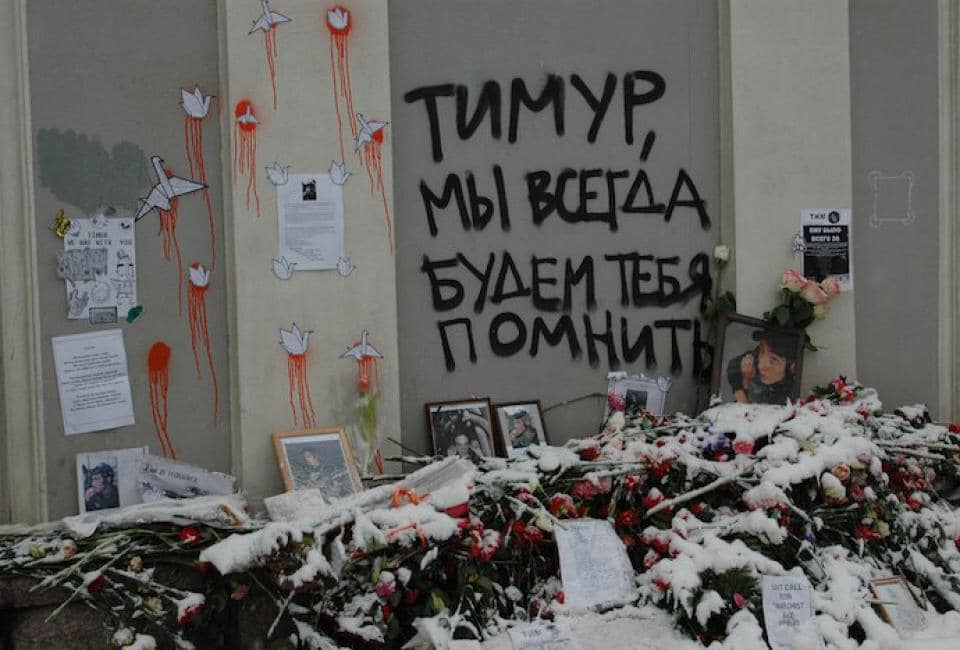
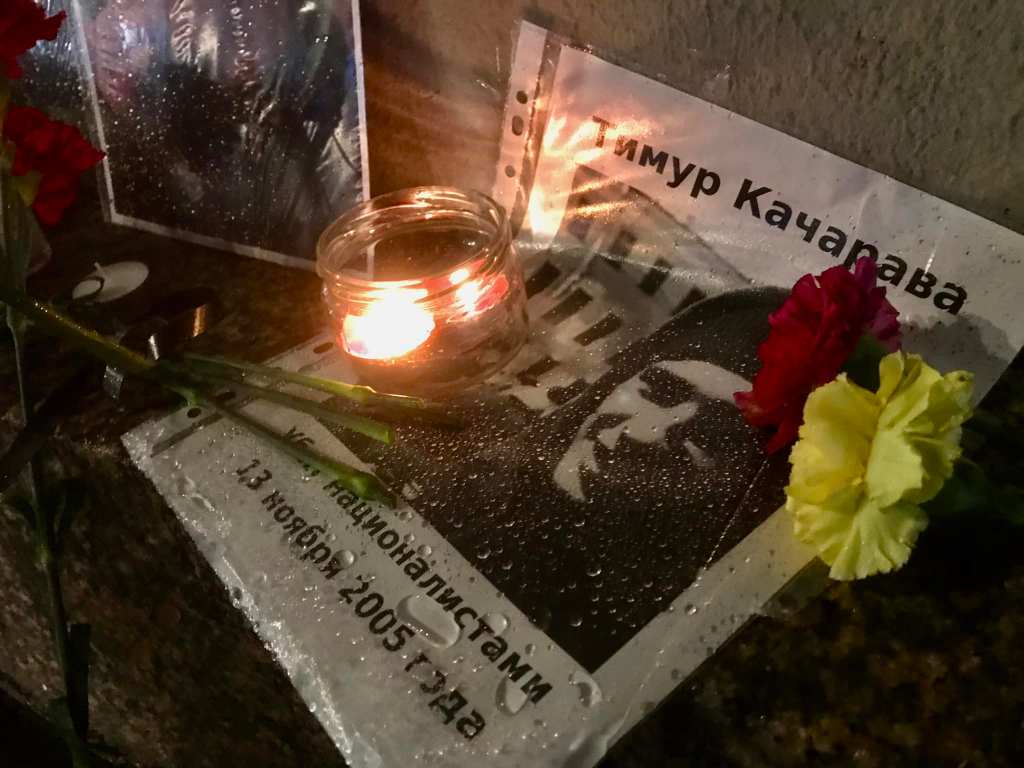
 Network case defendants Viktor Filinkov and Yuli Boyarshinov in the cage at court yesterday. Filinkov (left) wears a sweatshirt emblazoned with the slogan, “Your taser can’t kill our ideas.” Photo by Alexander Koryakov. Courtesy of Kommersant
Network case defendants Viktor Filinkov and Yuli Boyarshinov in the cage at court yesterday. Filinkov (left) wears a sweatshirt emblazoned with the slogan, “Your taser can’t kill our ideas.” Photo by Alexander Koryakov. Courtesy of Kommersant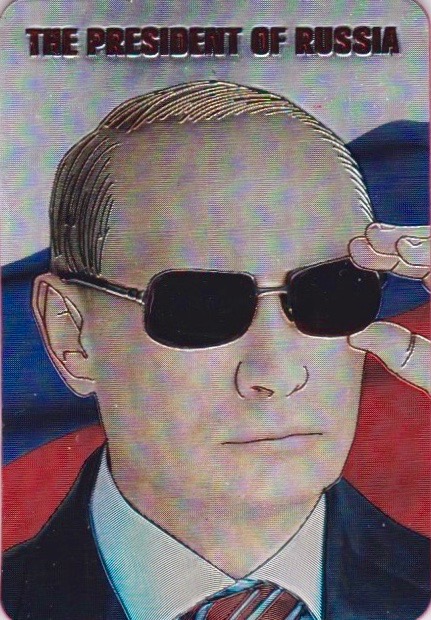
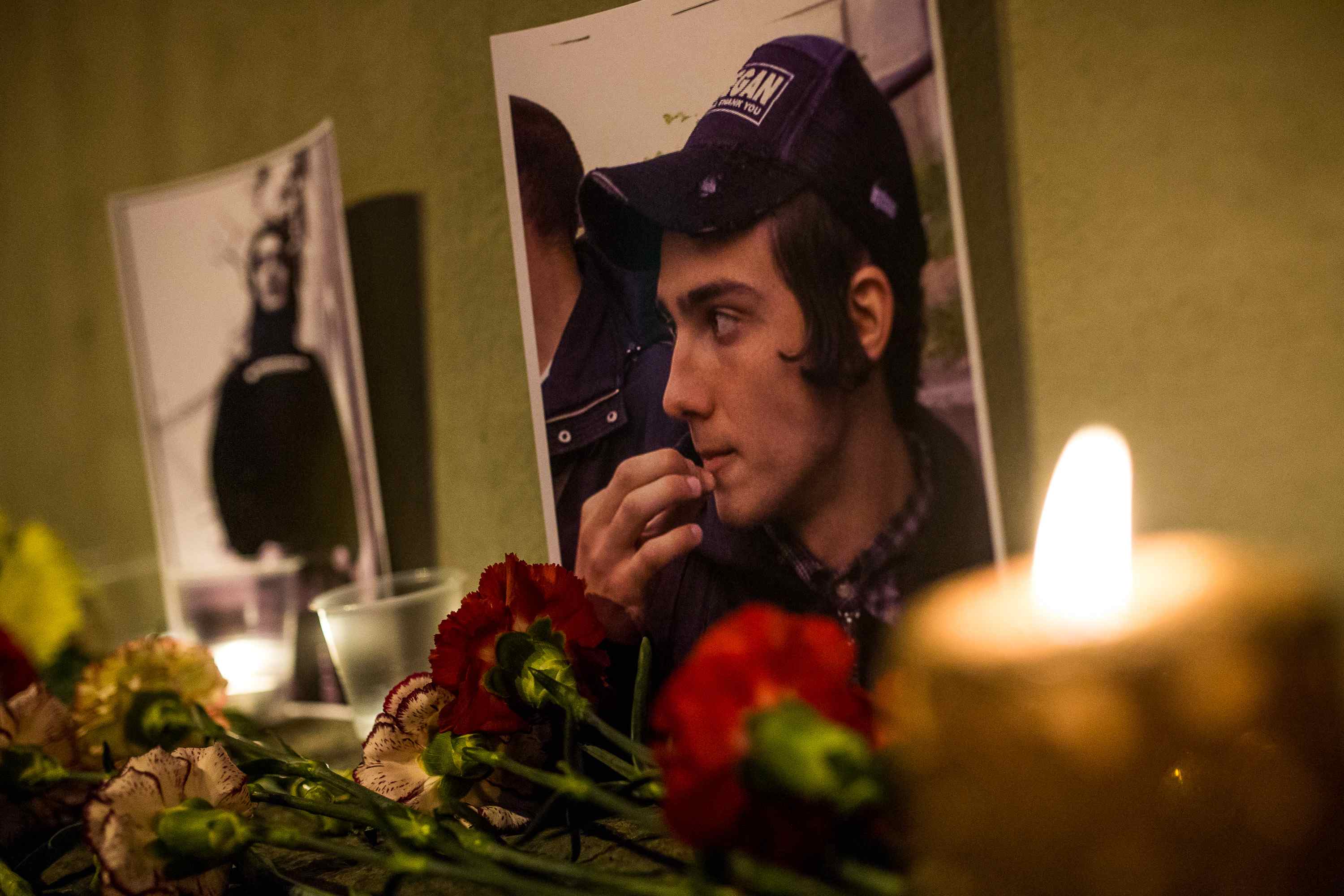 Picture of Timur Kacharava at a
Picture of Timur Kacharava at a 